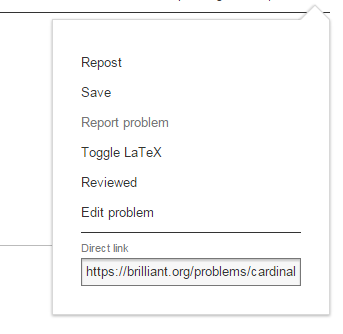Two Different Two Squares
What is the smallest positive integer that can be expressed as the sum of two positive perfect squares in two different ways?
The order of the squares in the summation doesn't matter.
The answer is 50.
This section requires Javascript.
You are seeing this because something didn't load right. We suggest you, (a) try
refreshing the page, (b) enabling javascript if it is disabled on your browser and,
finally, (c)
loading the
non-javascript version of this page
. We're sorry about the hassle.
1 solution
The blue link on perfect squares included 0 as a perfect square and the directions said only the sum had to be positive. I would argue for 25 as the answer as 0^2+5^2 and 3^2+4^2, based on the way the question was worded.
Log in to reply
I believe you're 100% correct. I had the same concern.
Log in to reply
Thanks. I've updated the problem statement. Those who previously answered 25 will be marked correct.
In future, if you spot any errors with a problem, you can “report” it by selecting "report problem" in the “line line line” menu in the top right corner. This will notify the problem creator who can fix the issues.

How did you get your answer as 50? Did you try all the cases before 50?
Log in to reply
Yes. Try all pairs (see last line in my solution).
Log in to reply
Is there an approach other than hit and trial?
Log in to reply
@Rishik Jain – I believed there is an approach by Gaussian integers . But I'm not sure how to tackle it.
@Calvin Lin Thoughts?
Alternatively, we could use Gaussian Integers.
Log in to reply
Can you share your method?
Log in to reply
'The primes in the Gaussian integers are:
- prime integers congruent to 3 modulo 4 ,
- numbers of the form a + b i where a 2 + b 2 is a prime integer congruent to 1 modulo 4 ,
- 1 + i
and their associates. An integer N can be written as the sum X 2 + Y 2 of two positive integers if N can be written as ( X + i Y ) ( X − i Y ) in the Gaussian integers. Since 2 = ( 1 + i ) ( 1 − i ) , any power of 2 can be so written. Similarly, any power of a prime integer congruent to 1 modulo 4 can be so written, but prime integers congruent to 3 modulo 4 cannot. Thus N can only be written as a sum of two squares when prime integers congruent to 3 modulo 4 occur an even number of times in the prime decomposition of N .
Since 1 + i and 1 − i are associate, ( 1 + i ) m divides X + i Y precisely when ( 1 − i ) m divides X − i Y . Thus, if 2 m is a factor of N , we must have ( 1 + i ) m as a factor of X + i Y , so powers of 2 do not give us any flexibility in the choice of X + i Y .
To be able to write N as a sum of two squares in at least two different ways, N must contain at least 2 prime factors which are congruent to 1 modulo 4 (these prime factors could be repeated).' - Mark Henning
From this, we can easily cut down on the number of cases having to be checked. We get that 50 is the smallest number satisfying.
Log in to reply
@Sharky Kesa – Looks like Mark Henning's solution.
Log in to reply
@Pi Han Goh – Yeah, basically got it from that. Forgot to quote it though.
Claim : The smallest positive integer that satisfy this property is 5 0 = 7 2 + 1 2 = 5 2 + 5 2 .
Proof : Suppose there is a smaller positive integer M < 5 0 that satisfy this condition, then M can be written as the sum of two (not necessarily) integers from the list in (at least) two different ways { 1 , 4 , 9 , 1 6 , 2 5 , 3 6 }
By listing out the possible paired sums as shown below, we can show that it is impossible.
( 1 , 4 ) , ( 1 , 9 ) , ( 1 , 1 6 ) , ( 1 , 2 5 ) , ( 1 , 3 6 ) , ( 4 , 9 ) , ( 4 , 1 6 ) , ( 4 , 2 5 ) , ( 4 , 3 6 ) , ( 4 , 4 9 ) , ( 9 , 1 6 ) , ( 9 , 2 5 ) , ( 9 , 3 6 ) , ( 1 6 , 2 5 ) , ( 1 6 , 3 6 ) , ( 2 5 , 3 6 )